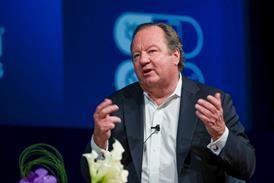Abstracted from Screen International in three parts: Part I
It's an ongoing process, but the balance of power in Hollywood is shifting out of all recognition. With more films now co-financed between independents and the seven Hollywood majors (49 out of the 101 to be released this year), it seems any deal is possible.
At the same time, the traditional idea of what constitutes a studio and what constitutes an independent is being eradicated. Producer deals shed by the studios are being picked up by independents which are virtually becoming studios themselves. What we knew previously as studios and independents are all becoming co-dependents.
Take the upcoming, as yet untitled, Mel Gibson movie: a studio has become involved, but the deal was controlled by independent companies. Directed by Richard Donner, the film is being produced by Donners Co with UK independent Winchester Films - which has a three-year deal with Donners Co - and with Gibson's Icon Entertainment. Winchester and Icon, which between them will handle international distribution, took the project to various studios in early October and sold it to Paramount for domestic for a whopping seven-figure sum.
"You almost turn into a studio for these producers," says Winchester president Hadeel Reda, who also negotiated a three-year development and co-production deal with Wind Dancer Films last October. "I'm not saying it's not a risky strategy but it's the only way to do it. It makes the studios more comfortable and they are happy to pay as much as 50% for domestic rights now. At the same time, they don't have the leverage they used to. We now have something they want."
Gary Levinsohn, one of the pioneers of co-financing at Paramount-based Mutual Film Co, adds: "The studios used to come to you saying, 'I want something'. Now it's more collaborative, more 'let's do something'."
Certainly the studio system has changed. When it started in the 1920s, the individual studios focused exclusively on movies. Now each one of them - with the exception of MGM - is owned by multinational conglomerates. Film-making is just one strand of their interests.
"For a big corporation, it costs too much money to make these things," says Joe Roth, head of Revolution Studios. "For the entertainment firms that own movie studios, movies are a necessary evil. They are something to fill their pipelines, whether it's HBO or BSkyB." Hence the desire of studios to partner with independents to spread financial risk and secure enough product to fill their various distribution outlets.
Roth is another pioneer in independent financing. Although well-known for running Disney and 20th Century Fox for much of the 1990s, he also co-founded Morgan Creek in 1987 and his current venture, Revolution Studios, is the classic new model for an independent in Hollywood.
Indeed, Revolution offers its partner studio, Columbia Pictures, access to five to seven studio-level projects a year such as America's Sweethearts, The Animal and Blackhawk Down. Sony paid $75m for a 7.5% stake in Revolution, taking North American and numerous international rights on the films. On a $40m movie, according to data compiled by Forbes magazine, Sony pays $20m, Revolution itself pays $7m, German partner Senator Film pays $6m, Fox Broadcasting pays $5m for US TV rights and Japanese video partner Pony Canyon stumps up $2m.
On the other hand, if the movie is a $100m hit in the US market, taking another $100m at the international box office and $140m in worldwide TV and home video revenues, Sony will only recoup its initial production and p&a outlay along with a $20m distribution fee and a 7.5% share in the $72m profit which would go back to Revolution.
What is more important for SPE than significant upside is access to such a volume of high-level pictures to feed its hungry foreign TV output deals - without the expense of developing them.
Twentieth Century Fox, which like Sony is well-known as a 'buyer', not a 'seller', studio, has a more symbiotic relationship with Arnon Milchan's New Regency Productions, in which it bought a 20% equity stake in 1997 as part of a 15-year deal. Fox and Regency partner on movies in three ways: movies which Regency fully finances (such as Don't Say A Word), movies Regency initiates and Fox co-finances (such as High Crimes) and movies which are co-developed and co-financed by Fox and Regency (such as Tim Allen vehicle Joe Somebody).
"They keep Germany, Italy and South Korea and even in Germany, we have an ongoing distribution relationship with The Taurus Group," explains Fox co-chairman Jim Gianopulos. "It makes sense for us to keep hold of the distribution rights. You have to keep a balance between your international distribution operations, where you have overheads to support, and your output partnerships, where you have to keep up a supply of films."
The incentive for Gianopulos to partner with companies such as Regency is that they bring him projects to feed his pipelines as well as finance. "We are much more open to co-finance and co-distribution when they bring us the project," he stresses.
But while Regency has been developing and producing films for over a decade, start-up outfits need to spend the necessary time building up that capability - which is neither cheap nor quick, as the studios themselves know only too well. Last year, Sony struck another first-look deal for domestic rights with Escape Artists.
Escape Artists quickly brought together a network of international partners. However, it has yet to deliver any pictures. For well over a year, it has been busily developing and buying material and only now are the first films coming together.
Momentum in the UK is an equity partner in Escape Artists and helps finance the development of the films. "Escape Artists has not made a film yet for all the right reasons," says Momentum chief David Kosse. "And that is not only because of the strike threat and the war but also because they are investing so much in development."
Of course, Kosse is looking to access a breakout hit to drive his own TV negotiations. On average a film in the UK grosses 8.75% of US business, but breakout hits often outperform that model dramatically. "Those are the films we need," he says.



















No comments yet